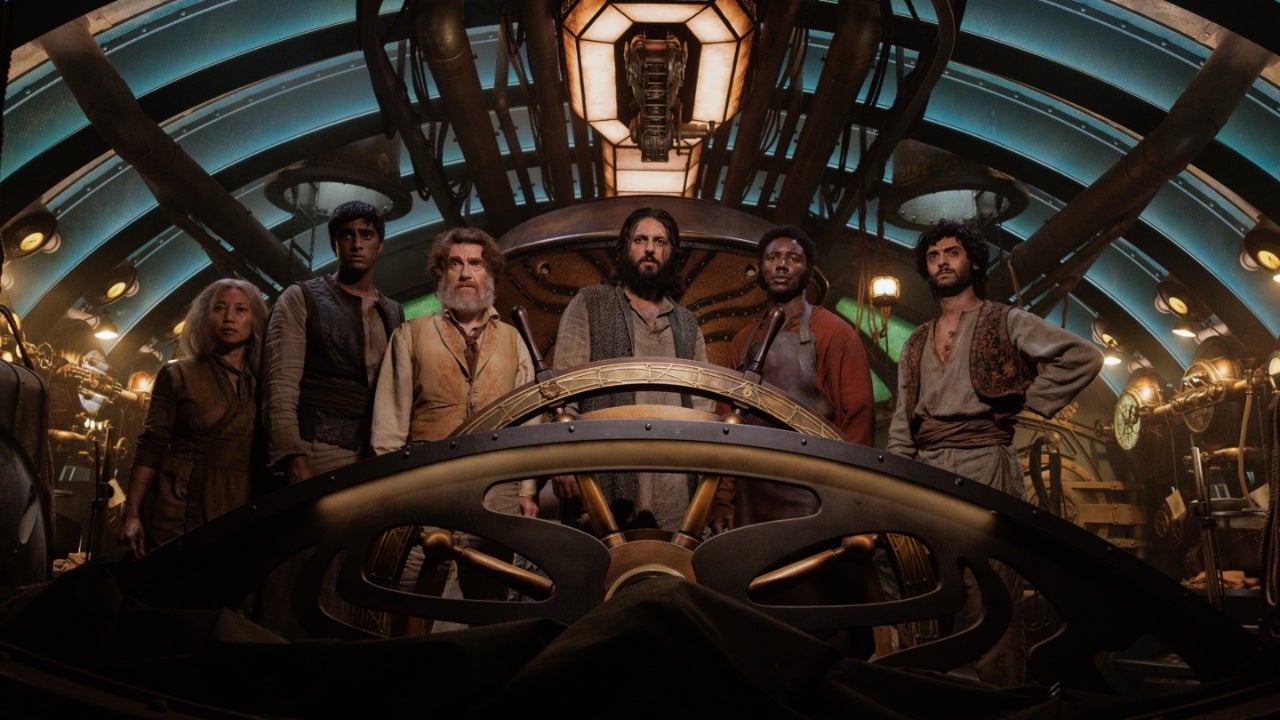
Nautilus’ two-episode premiere airs Sunday, June 29 on AMC at 10pm ET. New episodes air Sundays through August 17.
Some skepticism about AMC’s Nautilus is warranted. Has modern entertainment’s zeal for brand extensions and updating stories in the public domain reached the point where we’re making a TV series about how Captain Nemo came into possession of the fantastical submarine at the center of Jules Verne’s pioneering science-fiction novel Twenty Thousand Leagues Under the Sea? No need for such exasperation, however, because Nautilus knows exactly the type of show it needs to be: visually extravagant, a little dumb, and a whole lot of fun.
It starts with a combination of quite thrilling sequences in which Nemo – played by Star Trek: Discovery’s Shazad Latif as an Indian prince exacting revenge against the East India Company for imprisoning him – assembles his crew. The first comes as we witness the sinking of an EIC ship, during which Company men Director Crawley (Damien Garvey) and Captain Youngblood (Jacob Collins-Levy) come into focus as the antagonists, and Nemo takes as hostages high-society woman Humility Lucas (Georgia Flood), her no-nonsense maid Loti (Céline Menville), and powder boy Blaster (Kayden Price). There’s the sense that this kidnapping is not a terrible interruption for Humility – journeying, as she was, to an arranged marriage with the rather pompous Lord Pitt (Cameron Cuffe). And to the show’s (and Flood’s) credit, she comes across as rather delightful and curious about her new, submersible quarters. It’s maybe too good of a job: While Nautilus doesn’t quite drag it out, its middle episodes do indulge with some will-she/won’t-she about Humility staying on permanently that feel like fake suspense. More successful are the sparks between her character and Nemo: Flood and Latif have great chemistry as they push and pull against each other, perfect for the kind of swashbuckler Nautilus is at heart.
The rest of the team is introduced in the premiere’s flashback jailbreak. Its members largely stand out as distinct personalities – a wannabe revolutionary, a Maori cook, a large and mysterious man who speaks an unknown language – but they’re kept as archetypes for much of the season. It’s justified in Nemo’s own single-minded focus on revenge, and they’re never shunted to the side, but I still wish wish characters like all-around fighter Suyin (Ling Cooper Tang) or first mate Boniface (Pacharo Mzembe) got their own spotlight episodes – or at least had more chances earlier to establish more of who they are and what’s driving them.
Nautilus’ best self emerges in the front half of the season, when it cruises in a more episodic mode. This being Twenty Thousand Leagues there’s the giant squid fight, but there are also detours to remote islands or sketchy palaces, mixed with the occasional mechanical danger. Hints of this also present itself in guest spots from actors like Richard E. Grant, Anna Torv, and Shabana Azeez (based on how little she appears, you can tell this was shot before she broke out on The Pitt). It’s the kind of fun you’d find in Syfy shows like Warehouse 13 or Sanctuary, maybe even Xena: Warrior Princess. The writing isn’t always the best – sometimes corny, sometimes laying the themes on a bit thick – but the actors do good by it, and it’s directed and edited with aplomb. Visually, Nautilus often looks extravagant; the interiors of the ship itself are something to behold, and the VFX hold together slightly better than those aforementioned Syfy shows, give or take a couple instances of noticeably flimsy CGI.
It’s less interesting to follow Company business through the introduction of army Captain Millais (Luke Arnold), who holds some mysterious connection to Nemo. Some of his arc is compelling and complicated enough to garner our sympathy, but it’s given more screentime than it needs. It’s also hard to really care at all about Lord Pitt, who’s both fittingly annoying and slightly boring.
It’s this focus that leads to some stumbles in later episodes. The adventures of the week take less precedence, and the desire to tie up loose ends leads to things feeling somewhat rushed. Fortunately, even these lesser passages are floated along by some very freaky sea life and dastardly plotting, and Nautilus manages to right the ship by the end. It even manages to take a dive (albeit a shallow one) into the complexities of revolt, imperialism, and exploitation.












